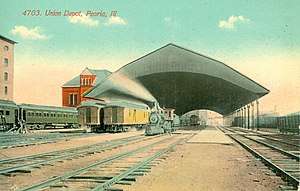Peoria Union Station
Peoria Union Station was a passenger rail hub for north-central Illinois, in Peoria, Illinois. Built in the Second Empire architecture style, it was located on Depot Street, between State and Oak Streets, near the Illinois River.[1] At its peak, it had seven tracks operating. However, even by World War II, it was only a junction point for regional lines that seldom extended beyond the state of Illinois.[2] This station, the Rock Island Depot and the Illinois Terminal (for an interurban line) reached their peak volume of trains in 1920 with 110 trains running in and out daily.[3]
Peoria Union Station | ||||||||||||||||||||||||||||||||||||||||||||||||||||||||||||||||||||||||||||
|---|---|---|---|---|---|---|---|---|---|---|---|---|---|---|---|---|---|---|---|---|---|---|---|---|---|---|---|---|---|---|---|---|---|---|---|---|---|---|---|---|---|---|---|---|---|---|---|---|---|---|---|---|---|---|---|---|---|---|---|---|---|---|---|---|---|---|---|---|---|---|---|---|---|---|---|---|
 Postcard of Union Station in Peoria, Illinois, sometime between 1907-1915 | ||||||||||||||||||||||||||||||||||||||||||||||||||||||||||||||||||||||||||||
| Location | Depot Street, Peoria, Illinois United States | |||||||||||||||||||||||||||||||||||||||||||||||||||||||||||||||||||||||||||
| Coordinates | 40°41′04″N 89°35′39″W | |||||||||||||||||||||||||||||||||||||||||||||||||||||||||||||||||||||||||||
| History | ||||||||||||||||||||||||||||||||||||||||||||||||||||||||||||||||||||||||||||
| Opened | 1882 | |||||||||||||||||||||||||||||||||||||||||||||||||||||||||||||||||||||||||||
| Closed | 1961 | |||||||||||||||||||||||||||||||||||||||||||||||||||||||||||||||||||||||||||
| Former services | ||||||||||||||||||||||||||||||||||||||||||||||||||||||||||||||||||||||||||||
| ||||||||||||||||||||||||||||||||||||||||||||||||||||||||||||||||||||||||||||
Tenant railroads in the middle of the 20th Century included the Burlington Route, the New York Central Railroad (the legacy routes of the Cleveland, Cincinnati, Chicago and St. Louis Railway, also known as the 'Big Four') and New York, Chicago & St. Louis (Nickel Plate Road).[4]
The Alton Railroad, Chicago & Illinois Midland, Chicago & North Western, Illinois Central Railroad, Pennsylvania Railroad and Toledo, Peoria & Western used the station until the 1930s.[5]
More significant long distance train routes went through Galesburg, Illinois to the northwest and Bloomington, Illinois to the southeast, and the station had an early decline. The station was last used in 1955, and was destroyed by fire 1961.[1] The last Nickel Plate train from the station was a local train to Frankfort, Indiana in 1951. In 1955 Burlington shifted its trains to a separate station northeast of Union Station until it discontinued Peoria trains in 1960.[6] New York Central in 1955 moved its Peorian (Peoria-Bloomington-Champaign-Urbana-Danville-Indianapolis) trains out of Union Station to nearby Pekin, and with the shift, renamed the train, Corn Belt Special,[7][8] until ending passenger service in 1957.[9]
Notes
- "Continuation Sheet: Peoria Warehouse District" (PDF). National Register of Historic Places. 14 July 2014. p. 5. Retrieved 17 September 2019.
- The Great Union Stations, 'Peoria's Passenger Trains of the Past'
- 'Journal Star,' 'Peoria Train History,' June 13, 2010
- 'Official Guide of the Railways,' August 1936, Index of Stations
- The Great Union Stations, 'Peoria's Passenger Trains of the Past'
- The Great Union Stations, 'Peoria's Passenger Trains of the Past'
- New York Central June 1951 timetable, Table 19 http://streamlinermemories.info/NYC/NYC51-6TT.pdf
- New York Central April 1957 timetable, Table 20
- The Great Union Stations, 'Peoria's Passenger Trains of the Past'